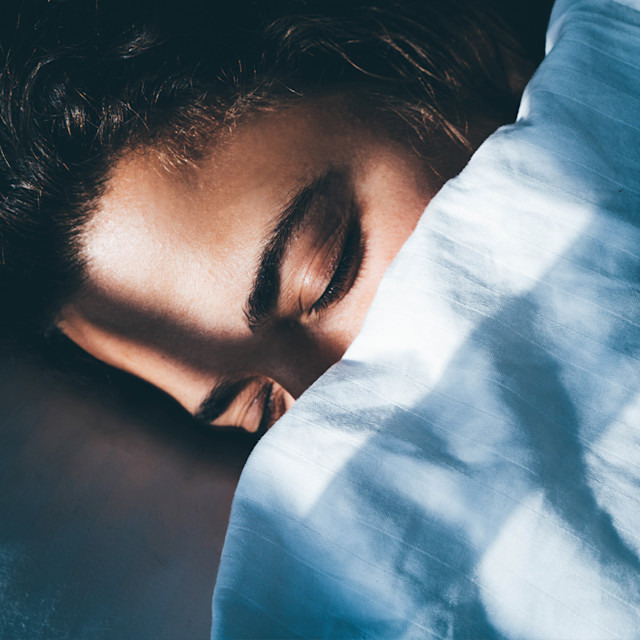There is no ideal bedtime—here's how to find yours according to a circadian physiologist.
If a constant lack of energy and inability to focus is giving you the suspicion that you’re not getting enough sleep, you’re far from alone. According to the Sleep Foundation, nearly half of Americans say they feel tired during the day between three and seven days per week, and 35.2% of Americans say they sleep less than the minimum seven recommended hours per night.
And even when you want to sleep, getting quality shut-eye isn’t always easy to come by: Between 10 and 30% of adults suffer from chronic insomnia. These stats are discouraging, especially considering that sleep is crucial for everything from mental health to physical recovery.
Believe it or not, getting higher-quality sleep may be as simple as shifting your bedtime a bit. Some of us are naturally early birds, others are night owls, while still others fall somewhere in between. You can blame whatever camp you fall into on your circadian rhythm or the natural process that regulates our sleep and wake cycles.
While work and home demands don’t always mean we can follow our natural circadian rhythm to a tee, figuring out what an ideal bedtime looks like for your body can go a long way. Here’s how to get started.
How to Identify Your Circadian Rhythm
Finding your ideal bedtime starts with identifying your natural circadian rhythm. And according to Dr. Jamie Zeitzer, Ph.D., a circadian physiologist who specializes in how light impacts circadian rhythms and the co-director of the Center for Sleep and Circadian Sciences at Stanford University, keeping a sleep log is a great place to start.
“Keeping a daily sleep log or diary for seven to 14 days on both work/school days and free days is a way to assess your natural sleep-wake pattern,” he says. “Log what day of the week it is and whether it’s a work/school day or free day, as well as when you went to bed, fell asleep, woke up, and got out of bed.”
Dr. Zeitzer also notes that it can also be useful to make note of other behaviors such as whether or not and at what time you consumed caffeine or alcohol, napped or exercised, or used electronics. “If you notice, for example, you naturally gravitate towards later sleep and wake times on non-work days (without an assist from a late nap or social obligation), there’s a good chance your ‘ideal’ bedtime skews later.”
There are also a handful of online resources that can help you assess your circadian rhythm. “Online questionnaires like the Morning-Eveningness questionnaire and the Munich Chronotype Questionnaire can be used to assess your circadian preference (in the case of the former) and the timing of your circadian system (in the case of the latter),” Dr. Zeitzer says. “These questionnaires have been found to align reasonably well with other more accurate measures available in a clinical setting, like the timing of your core body temperature and plasma melatonin.”
Finally, if you want to get really specific, you may actually be able to identify your circadian rhythm via blood test soon. “There is a promising new blood test on the horizon that aims to determine the timing of a person’s internal clock by analyzing a combination of molecules in a single blood draw,” Dr. Zeitzer adds.
How To Improve Your Sleep Quality
While figuring out what general range your ideal bedtime falls into is a great first step, it’s not the only step you need to take toward improving the quality of your sleep. And although typical rules of sleep hygiene are important—avoiding screens close to bedtime, keeping your bedroom cool and dark, the list goes on—what you do during the day is important for sleep quality, too.
“Get bright light first thing in the morning,” Dr. Zeitzer says. “You’ll want to get at least 10 minutes of light as soon as possible after waking up to reset your circadian rhythm for the day.”
It’s also important to avoid bright light about 90 minutes before bed, he says, to stop it from keeping you awake. “Dim the lights in the evenings.”
Avoiding caffeine, large meals, intense exercise, and alcohol too late in the day can go a long way, too, as all four can keep you up or wake you up during the night. “Do a relaxing bedtime routine: Make time for calming activities in the run-up to bedtime like reading, journaling, or doing yoga, all in dim or low light,” Dr. Zetzer suggests. “This will help slow your brain down for sleep. Finding what actually relaxes you is also important, as it isn't the same for everyone.
Finally, keeping your bedroom dark, cool, and quiet is key. “Set your thermostat to 65 to 68 degrees Fahrenheit, use blackout curtains, and wear earplugs and an eye mask to stop anything from keeping you up or waking you up during the night,” Dr. Zeitzer says.
While going to bed at the time your body wants to can certainly improve your sleep quality, Dr. Zeitzer emphasizes that honoring your ideal bedtime doesn’t mean your need less sleep. “Everyone has a different base need; it’s not eight hours for everyone. But you still need to get the right amount of sleep for you,” he says. “Working with your circadian rhythm will, however, give you a much better chance of actually getting enough sleep and helping it be as naturalistic and restorative as it can be.”
